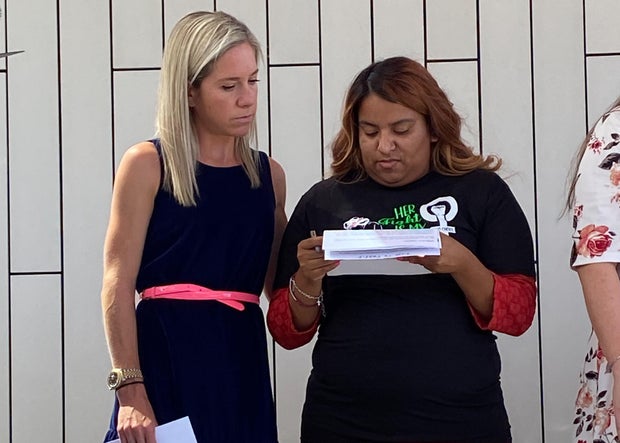CBS News
Austin, Texas — A group of women suing Texas for clarity about exceptions to the state’s strict abortion laws gave emotional testimony Wednesday about the life-threatening risks to their health they endured when they say they were denied care during their failed pregnancies.
The lawsuit, which was brought by the Center for Reproductive Rights, is believed to be the first to be brought by women who were denied abortions after the Supreme Court overturned Roe v. Wade last year. The women are not trying to overturn the state’s abortion ban, but rather, are seeking a preliminary injunction on the state’s abortion laws to allow lifesaving procedures.
State Attorney General Ken Paxton’s office, which is defending the ban, argues the women lack the standing to sue, asserting in its motion to dismiss the lawsuit that “none of the patients’ alleged injuries are traceable to defendants.” The state’s lawyers asked the witnesses Wednesday if Paxton had personally told them they could not have an abortion.
The court is also hearing the state’s motion to dismiss the case. In opening arguments, the state argued that the plaintiffs — 15 in total — are pursuing the case merely because they are unhappy with the state’s abortion laws, and the remedy for that would rest with the Legislature, not the court.
Four women who said they were denied abortions and a Houston OB-GYN representing her patients are testifying over two days.
SUZANNE CORDEIRO/AFP via Getty Images
Samantha Casiano, who was forced to carry a pregnancy to term, even though her baby suffered from a condition doctors told her was 100% fatal, testified that her doctor told her that she did not have any options beyond continuing her pregnancy because of Texas’ abortion laws.
“I felt like I was abandoned,” she said. “I felt like I didn’t know how to deal with the situation.”
Casiano, who has four children, had to carry the baby to term. Casiano’s baby daughter died four hours after birth. In describing how she couldn’t go to work because everyone knew she was pregnant and couldn’t bear the questions about her baby, Casiano became so emotional that she threw up in the courtroom. The court recessed immediately afterward.
Texas’ abortion laws
Texas has some of the strictest abortion laws in the country. In 2021, Texas Gov. Greg Abbott signed into law called SB8 that bans abortions after six weeks of pregnancy. A “trigger ban” also went into effect that made it a felony for doctors in the state to perform an abortion unless the life of the patient is in danger.
Emotional testimony
Three women and one doctor testified Wednesday morning about the medical complications they faced in their pregnancies before Casiano’s testimony.
Casiano said she looked into leaving the state for an abortion, as others had, but she worried about the cost and she feared she and her husband would “get in trouble.”
“I have children, I can’t go to jail,” she said she was thinking. “I can’t get this fine, how would I pay for that, I can’t lose my job. I felt like I had no options.”
All the women testifying emphasized that they had wanted their pregnancies, and they described the devastation they felt upon learning their pregnancies were not viable.
Amanda Zurawski, who attended President Biden’s State of the Union address this year as a guest of first lady Jill Biden, testified that she developed sepsis after her water broke, but did not go into labor. She said she suffered from a number of medical complications and knew she would miscarry, but doctors told her they could not induce labor because the fetus still had a heartbeat.
Zurawski eventually miscarried three days later. As a result of two bouts of sepsis, she said one of her fallopian tubes has closed permanently, and she has had to undergo several procedures to reconstruct her uterus. She said her doctor told her that the only way she could get pregnant again was through IVF. Since then, Zurawski has undergone three egg retrievals, but she and her husband still have concerns about a future pregnancy.
Ashley Brandt, another one of the plaintiffs, testified that she was excited to learn she was carrying twins. But at her 12-week ultrasound, she discovered that one of the twins had developed a fatal condition that could trigger a miscarriage of the other twin. She said her doctor told her that if she terminated that one twin, it would save the life of the other. But the procedure was categorized as an abortion under Texas laws.
Brandt and her husband eventually flew to Colorado for the procedure. They returned to Houston the next day, but soon after their arrival, Brandt experienced some bleeding and could not contact the doctor in Colorado. She testified that she feared going to the emergency room, since she had had an abortion.
“I didn’t want anyone to get in trouble, but I didn’t want to get in trouble,” Brandt said. “It seems silly now, but that’s what was holding me back from going.”
Brandt ultimately did go to the emergency room, and testified that she initially hesitated to tell the doctors about the procedure she had undergone. She divulged her abortion and was treated, and eventually delivered a healthy baby girl. But after the harrowing pregnancy, she said her husband underwent a vasectomy because they worried about undergoing a similar ordeal again.
“I don’t feel safe to have children in Texas anymore,” she said through tears. “I knew it was very clear my health didn’t matter, but my daughter’s health didn’t really matter [either].”

